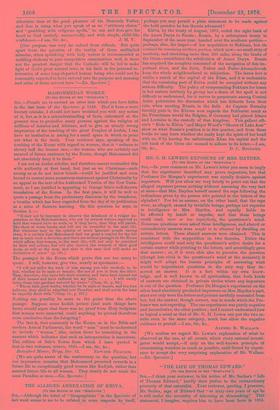MAHOMMEDAN WOMEN.
[TO THE EDITOR OP THE "SPECTATOR.")
SIR,—Permit me to correct an error into which you have fallen in the last issue of the Spectator, p. 1548. Had it been a mere literary mistake, I should not have troubled you with any notice of it, but as it is a misunderstanding of facts, calculated at the present time to prejudice many persons against the religion of millions of Asiatics and Africans, and to give an utterly wrong impression of the teaching of the great Prophet of Arabia, I can have no hesitation in asking for a small space in which to point out what is the truth. Your reviewer says, speaking of the
teaching of the Koran with regard to women, that it "reduces to slavery half the human race,—the women, who are certainly not assured of future existence by the Koran, though Mahommed did
not absolutely deny it to them."
1 am not an Arabic scholar, and therefore cannot contradict this with authority at first hand, but just as we Christians—such among us as do not know Greek—would be justified and even bound to correct some monstrous statement against Christianity by an appeal to the text of the Authorised Version of the New Testa- ment, so I am justified in appealing to George Sale's well-known translation of the Koran. In the first place, it will be well to quote a passage from the preliminary discourse by the translator, a treatise which has been regarded from the day of its publication as a mine of Eastern learning. On this question he says, in Section A :-
"It may not be improper to observe the falsehood of a vulgar im- putation on the Mahommedans, who are by several writers reported to hold that women have no souls, or if they have, that they will perish, lice those of brute beasts, and will not be rewarded in the next life. But whatever may be the opinion of some ignorant people among them, it is certain that Mahommed had too great a respect for the fair sex to teach such a doctrine, and there are several passages in the Koran which affirm that women, in the next life, will not only be punished for their evil actions, but will also receive the rewards of their good deeds, as well as the men, and that in this case God will make no distinction of sexes." (p. 141.) The passages in the Koran which prove this are too many to quote. I will, however, give two, merely as specimens :- "I will not suffer the work of him among you who worketh to be lost, whether he be male or female; the one of you is from the other. They, therefore, who have left their country, and have been turned out
of their houses and have suffered for my sake I will surely bring them into gardens watered by rivers." (Chap. iii., p. 83.)
s' Whose cloth good works, whether he be male or female, and is a true believer, they shall be admitted into Paradise, and shall not in the least be unjustly dealt with." (Chap. iv., p. 107.)
Nothing can possibly be more to the point than the above passage. Suppose some foolish person (and such things have been) should argue that there was no proof from Holy Scripture that women were immortal, could anything be quoted therefrom more conclusive than the foregoing?
The fact is, that commonly in the Koran, as in the Bible and modern Acts of Parliament, the word " man " must be understood to include " woman " also, unless there be something in the context which indicates that such an interpretation is inaccurate. The edition of Sale's Koran from which I have quoted is that in two volumes, octavo, 1825.-1 am, Sir, &c.,
Bottesford Manor, Brigg, Dec. 12. EDWARD PEACOCK.
[We are quite aware of the controversy on the question, but our impression remains that Mahommed promised rewards in a future life to exceptionally good women like Kadijah, rather than assured future life to all women. They clearly do not reach the same Paradise as men.—En. Spectator.]


































 Previous page
Previous page